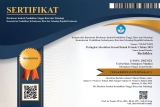PERLINDUNGAN HUKUM DAN ETIKA BAGI PENGGUNA FINTECH PEER TO PEER LENDING DI INDONESIA
Abstract
Keywords
Full Text:
PDFReferences
Alifia Salvasani , Penanganan Terhadap Financial Technology Peer-to-peer Lending Ilegal Melalui Otoritas Jasa Keuangan (Studi Pada OJK Jakarta Pusat), Jurnal Private Law, ISSN 2337-4640 (Printed) 2715-5676 (Online), Jurnal Privat Law Vol. VIII No. 2 Juli-Desember 2020
AdBispreneur : Jurnal Pemikiran dan Penelitian Administrasi Bisnis dan Kewirausahaan Vol.3, No. 2, Agustus 2018, DOI : https://doi.org/10.24198/adbispreneur.v3i2.17836, hal. 89-100
Anjan V. Thakor, Fintech and banking: What do we know? , Journal of Financial Intermediation, August 2019, Journal of Financial Intermediation 41:100833 https://www.researchgate.net/
Agrata, Gupta. 2018. “A Paradigm Shift in Banking: Unfolding Asia’s FinTech Adventures.” In Banking and Finance Issues in Emerging Markets, edited by Xia Chun, 25:215–54. International Symposia in Economic Theory and Econometrics. Emerald Publishing Limited. https://doi.org/10.1108/S1571- 038620180000025010
Atikah Ika, 2020, Jurnal Hukum dan Peradilan – ISSN: 2303-3274 (p), 2528-1100 (e) Vol. 9, no. 1 (2020), pp. 132-153, doi: 10.25216/JHP.9.1.2020.132-153
Brereton, Pearl, Barbara A. Kitchenham, David Budgen, Mark Turner, and Mohamed Khalil. (2017) “Lessons from applying the systematic literature review process within the software engineering domain.” J Syst Softw 80: 571–583.
Disemadi, H, S., Yusro, M, A., Balqis, W, G. 2020. The Problems of Consumer Protection in Fintech Peer To Peer Lending Business Activities in Indonesia. Sociological Jurisprudence Journal. Volume 3 Issue 2. Page 91 - 97. https://doi.org/10.22225/scj.3.2.1798.91-97
Greenbaum, S., Thakor, A., Boot, A., 2019. Contemporary Financial Intermediation, fourth ed. Elsevier July, © 2019 Elsevier Inc. All rights reserved.
Gimpel, Henner, Daniel Rau, and Maximilian Röglinger. 2018. “Understanding FinTech Start-Ups – a Taxonomy of Consumer-Oriented Service Offerings.” Electroni Market, The International Journal on Networked Business 28. Springer US:245–64.
Hendriyani, Chandra, Raharja, and Sam’un Jaja. (2018). Analysis Building Customer Engagement Through E-CRM in the Era of Digital Banking in Indonesia. International Journal of Economic Policy in Emerging Economies, 11(5)
Kitchenham, Barbara, O. Pearl Brereton, David Budgen, Mark Turner, John Bailey, and Stephen Linkman. (2019) “Systematic literature reviews in software engineering - A systematic literature review.” Inf Softw Technol 51: 7–15.
Lenz, Rainer. 2016. “Peer-to-Peer Lending: Opportunities and Risks.” European Journal of Risk and Regulation 7 (4):688–700.
Muhammad rizal et all, fintech sebagai salah satu solusi pembiayaan bagi UMKM, Jurnal Pemikiran dan Penelitian Administrasi Bisnis dan Kewirausahaan 89 Vol.3, No. 2, Agustus 2018, DOI : https://doi.org/10.24198/adbispreneur.v3i2.17836, hal. 89-10
Nurul Rahmayani, Tinjauan Hukum Perlindungan Konsumen Terkait Pengawasan Perusahaan Berbasis Financial Technology di Indonesia, Pagaruyuang Law Journal, Volume 2 No. 1, Juli 2018
Peter Mahmud Marzuki, Pengantar Ilmu Hukum, Kencana, Jakarta, 2008, hlm. 158
Jonas, Is P2P Lending Ethical? Sustainable Investing, Is P2P Lending Ethical? Sustainable Investing (thepoorinvestor.eu), 8 april 2020
OJK, Dattar Perusahaan Fintech Peer to Peer Lending Ilegal (DAFTAR PERUSAHAAN FINTECH Juli 2018 - Januari 2020), https://sikapiuangmu.ojk.go.id/
Seno wibowo gumbira,Dhiana Puspitawati, Kukuh tejo Murti, Unefficiency Settlement Of Fintech Lending Disputes And How Legal Framework To Settle It: Indonesia Perspective, Journal of Contemporary Issues in Business and Government Vol. 27, No. 2, 2021 https://cibg.org.au/ P-ISSN: 2204-1990; E-ISSN: 1323-6903 DOI: 10.47750/cibg.2021.27.02.413 Published by Society of Business and management.
Salma, C. R. (2019). Perlindungan Hukum Terhadap Penerima Pinjaman Dalam Perjanjian Penggunaan Layanan Peer To Peer Lending. Kumpulan Jurnal Mahasiswa Fakultas Hukum, 5(1), 23–37.
Wahyuni, R, A, E. (2020). Strategy Of Illegal Technology Financial Management In Form Of Online Loans. Jurnal Hukum Prasada, 7(1), 27-33. doi: https://doi.org/10.22225/jhp.7.1.1324.27-33
DOI: https://doi.org/10.21107/ri.v16i2.11867
Refbacks
- There are currently no refbacks.

Rechtidee is licensed under a Creative Commons Attribution-ShareAlike 4.0 International License.
Indexing and Abstracting:












